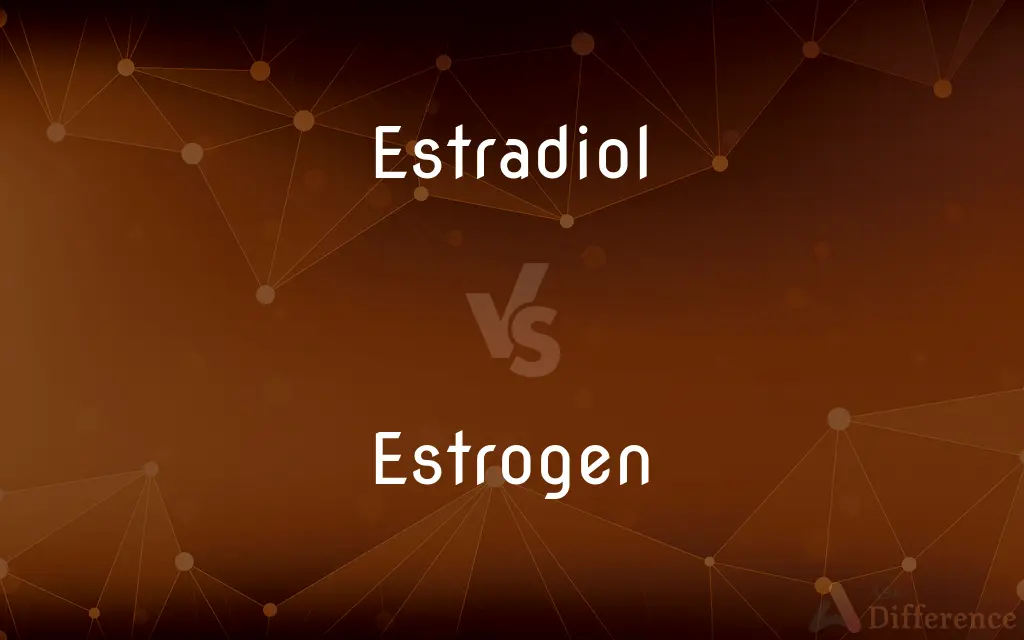Estradiol vs. Estrogen — What's the Difference?
Edited by Tayyaba Rehman — By Urooj Arif — Updated on May 7, 2024
Estradiol is a specific form of estrogen, which is a broader category of female reproductive hormones. Estradiol is the most potent estrogen during reproductive years, whereas estrogen encompasses multiple hormones like estrone and estriol.

Difference Between Estradiol and Estrogen
Table of Contents
ADVERTISEMENT
Key Differences
Estradiol is the most potent and prevalent estrogen during a woman's reproductive years. It plays a critical role in regulating the menstrual cycle and is important for maintaining healthy bones and reproductive tissues. Estrogen, on the other hand, is a collective term that includes estradiol along with other forms like estrone and estriol.
Estradiol levels fluctuate significantly throughout the menstrual cycle and decrease after menopause, leading to changes in fertility and bone density. Estrogen as a whole also varies, but different forms dominate at various life stages, such as estrone after menopause.
Estradiol is often used in hormone replacement therapy (HRT) for menopausal symptoms and other hormonal issues. Estrogen treatments generally consist of a combination of various forms or sometimes focus on a specific form based on the individual's needs.
Estradiol levels can be measured specifically to assess ovarian function, while estrogen levels can be measured to get a broader picture of hormonal health. Each form provides different insights based on its specific characteristics and prevalence.
Comparison Chart
Definition
Most potent estrogen hormone
Collective term for female hormones
ADVERTISEMENT
Dominance
Reproductive years
Varies by life stage
Forms
One specific hormone
Includes estrone, estriol, etc.
Medical Uses
Hormone therapy
Combination therapy
Testing
Assesses ovarian function
Provides broader hormonal insights
Compare with Definitions
Estradiol
Plays a critical role in female reproductive tissues.
Estradiol influences the growth and function of the uterus and ovaries.
Estrogen
Influences the regulation of the menstrual cycle and reproductive system.
Estrogen plays a dominant role in the menstrual cycle's various phases.
Estradiol
A form of estrogen synthesized mainly by the ovaries.
In females, the majority of estradiol is produced by the ovaries.
Estrogen
Used in various forms for hormone replacement therapy.
Estrogen patches are a common form of hormone replacement therapy.
Estradiol
Its levels are a key marker in fertility assessments.
High estradiol levels might indicate a positive response to fertility treatments.
Estrogen
Affects various systems beyond the reproductive system, including the cardiovascular and skeletal systems.
Estrogen has protective effects on bone density and cardiovascular health.
Estradiol
Used clinically to treat symptoms of menopause and other hormonal imbalances.
Doctors often prescribe estradiol to alleviate hot flashes and other menopausal symptoms.
Estrogen
Any of several synthetic compounds that mimic the physiologic activity of estrogen, such as ethinyl estradiol, used primarily in oral contraceptives.
Estradiol
Essential for maintaining healthy skin and hair.
Estradiol contributes to the elasticity and strength of skin and hair.
Estradiol
An estrogenic hormone, C18H24O2, that is produced by the ovaries and is the dominant naturally occurring estrogen in women between puberty and menopause. It is used to treat menopausal symptoms and other conditions.
Estradiol
A natural estrogenic hormone that is a phenolic alcohol estra-1,3,5-triene-3,17-diol (C18H24O2) secreted chiefly by the ovaries of all vertebrates, that is a major and the most potent of the naturally occurring estrogens; the semisynthetic esterified compound is used medicinally to treat estrogen deficiency and breast cancer.
Estradiol
The most powerful female hormone that occurs naturally; synthesized and used to treat estrogen deficiency and breast cancer
Common Curiosities
Is estradiol stronger than other estrogens?
Yes, estradiol is the strongest and most prevalent estrogen during reproductive years.
When is estradiol dominant in the body?
Estradiol is dominant during a woman's reproductive years.
Can estrogen levels indicate menopause?
Yes, decreased estrogen levels, especially estradiol, often signify menopause.
Is estrogen necessary for bone health?
Yes, estrogen is vital for maintaining bone density.
Do men produce estradiol?
Yes, men produce small amounts of estradiol for bone and reproductive health.
Does estrogen therapy involve estradiol alone?
Not necessarily; it can include combinations or other forms like estrone.
Is estradiol related to fertility?
Yes, estradiol is essential for ovulation and pregnancy.
Can estradiol impact mood?
Yes, fluctuations in estradiol levels can affect mood and emotional well-being.
What are the primary types of estrogen?
The main forms are estradiol, estrone, and estriol.
Can low estrogen affect cardiovascular health?
Yes, low estrogen is associated with increased cardiovascular risks.
Is estradiol included in hormone therapy?
Yes, estradiol is commonly included in hormone therapy for menopausal symptoms.
Does estradiol production decrease with age?
Yes, estradiol production decreases significantly after menopause.
Why is estradiol measured separately?
Its measurement helps specifically assess reproductive and ovarian health.
Do estradiol and estrogen both influence menstruation?
Yes, they both play key roles in regulating the menstrual cycle.
Is estradiol found in birth control pills?
Yes, synthetic estradiol or similar hormones are often used in birth control.
Share Your Discovery

Previous Comparison
Pentyl vs. Amyl
Next Comparison
Cyanocobalamin vs. HydroxocobalaminAuthor Spotlight
Written by
Urooj ArifUrooj is a skilled content writer at Ask Difference, known for her exceptional ability to simplify complex topics into engaging and informative content. With a passion for research and a flair for clear, concise writing, she consistently delivers articles that resonate with our diverse audience.
Edited by
Tayyaba RehmanTayyaba Rehman is a distinguished writer, currently serving as a primary contributor to askdifference.com. As a researcher in semantics and etymology, Tayyaba's passion for the complexity of languages and their distinctions has found a perfect home on the platform. Tayyaba delves into the intricacies of language, distinguishing between commonly confused words and phrases, thereby providing clarity for readers worldwide.
















































